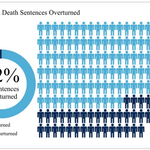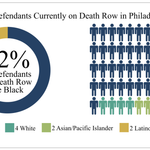
Citing race disparities, ineffective representation by court-appointed lawyers, and arbitrary case outcomes, the Philadelphia District Attorney’s Office has asked the Pennsylvania Supreme Court to strike down the state’s death penalty. In a brief filed on July 15, 2019 in the consolidated appeals of Philadelphia death-row prisoner Jermont Cox and Northumberland County’s Kevin Marinelli, the District Attorney’s office argued that Pennsylvania’s death penalty “has repeatedly been handed out in an unreliable and arbitrary manner” and urged the court to rule “that the death penalty, as it has been applied, violates the Pennsylvania Constitution’s ban on cruel punishments.”
Explaining the filing, Philadelphia District Attorney Larry Krasner (pictured) told The Appeal that the death penalty “really is not about the worst offenders. It really is about poverty. It really is about race.” Philadelphia prosecutors stressed that theme throughout their brief, finding that nearly three-quarters of the Philadelphia death sentences imposed between 1978 and 2017 had been overturned in the courts, mostly as a result of ineffective assistance from “under-funded, inadequately supported court-appointed counsel.” The result, city prosecutors said, was a death row overwhelmingly composed of poor black defendants who had been denied meaningful representation at trial.
The District Attorney’s study tracked 155 Philadelphia death sentences imposed over a nearly 40-year period. It found that:

- 72% of the cases (112 of 155) had been overturned “at some stage of post-conviction review”;
- Nearly two-thirds of those cases (66%) were reversed because of ineffective assistance of trial counsel;
- More than three-quarters of those reversed cases involved representation by court-appointed private lawyers dependent upon court funding for investigators, experts, and their own compensation; and
- 91% of the reversed cases (102 out of 112) ultimately ended up in a final, non-capital disposition.
“Where a majority of death sentenced defendants have been represented by poorly compensated, poorly supported court-appointed attorneys, there is a significant likelihood that capital punishment has not been reserved for the worst of the worst,’” the DA’s brief said. “Rather, what our study shows is that, as applied, Pennsylvania’s capital punishment regime may very well reserve death sentences for those who receive the ‘worst’ (i.e., the most poorly funded and inadequately supported) representation.”
The Philadelphia D.A.’s brief also said that its study “revealed equally troubling data” regarding the race of the 45 Philadelphia prisoners who remain on Pennsylvania’s death row. 82% of those prisoners, the brief said, are black; 91% are people of color.

Defense attorneys for Cox and Marinelli are asking the Pennsylvania Supreme Court to invoke its “King’s Bench” jurisdiction to make a special ruling to “strike down the Commonwealth’s capital punishment system as a prohibited cruel punishment.” The February 2019 petition highlighted the problems identified by the Pennsylvania Task Force and Advisory Committee on Capital Punishment, which released a report in 2018 summarizing years of research. Attorney Shawn Nolan wrote, “Although the system was intended to apply only to the worst of the worst, arbitrary factors, such as geography, poverty, mental illness, and race, best predict who ends up on death row.” The pleading asked that the court “order that all condemned prisoners be resentenced to life imprisonment” and that the death-penalty system be found to violate the Pennsylvania constitution.
The Pennsylvania Attorney General filed a brief in opposition to the death-row prisoners’ petitions, with the support of amicus briefs filed by the Pennsylvania District Attorneys Association, 13 Republican state senators, the Pennsylvania House Republican Caucus, and the Pennsylvania Fraternal Order of Police. The opposing briefs argued that the court should not intervene in what they characterized as a legislative issue. “In our constitutional system it is the legislature which best discerns and represents the will of a sovereign people,” the Attorney General wrote. The Republican senators’ brief expressed a similar sentiment, saying, “[t]he present matter, if accepted by the Court, stands to directly impede the Senators’ ability to perform their legislative function in matters involving the death penalty in Pennsylvania, which is a matter of significant public policy concern for the General Assembly.”
Elizabeth Weill-Greenberg, PHILADELPHIA D.A. ASKS COURT TO DECLARE DEATH PENALTY SYSTEM UNCONSTITUTIONAL, The Appeal, July 15, 2019; Alicia Victoria Lozano, Philadelphia DA Larry Krasner Challenges Pennsylvania’s Death Penalty, NBC Philadelphia, July 16, 2019; Dominique Mosbergen, Death Penalty Is Racist, Classist And Unconstitutional, Philadelphia DA Argues, HuffPost, July 16, 2019.
Read the briefs filed by the Philadelphia District Attorney’s Office and the Pennsylvania Attorney General and the amicus briefs filed by the Pennsylvania District Attorneys Association, 13 Republican State Senators, the Pennsylvania House Republican Caucus brief, and the Pennsylvania Fraternal Order of Police.
The graphics are from the brief filed by the Philadelphia District Attorney’s office.


